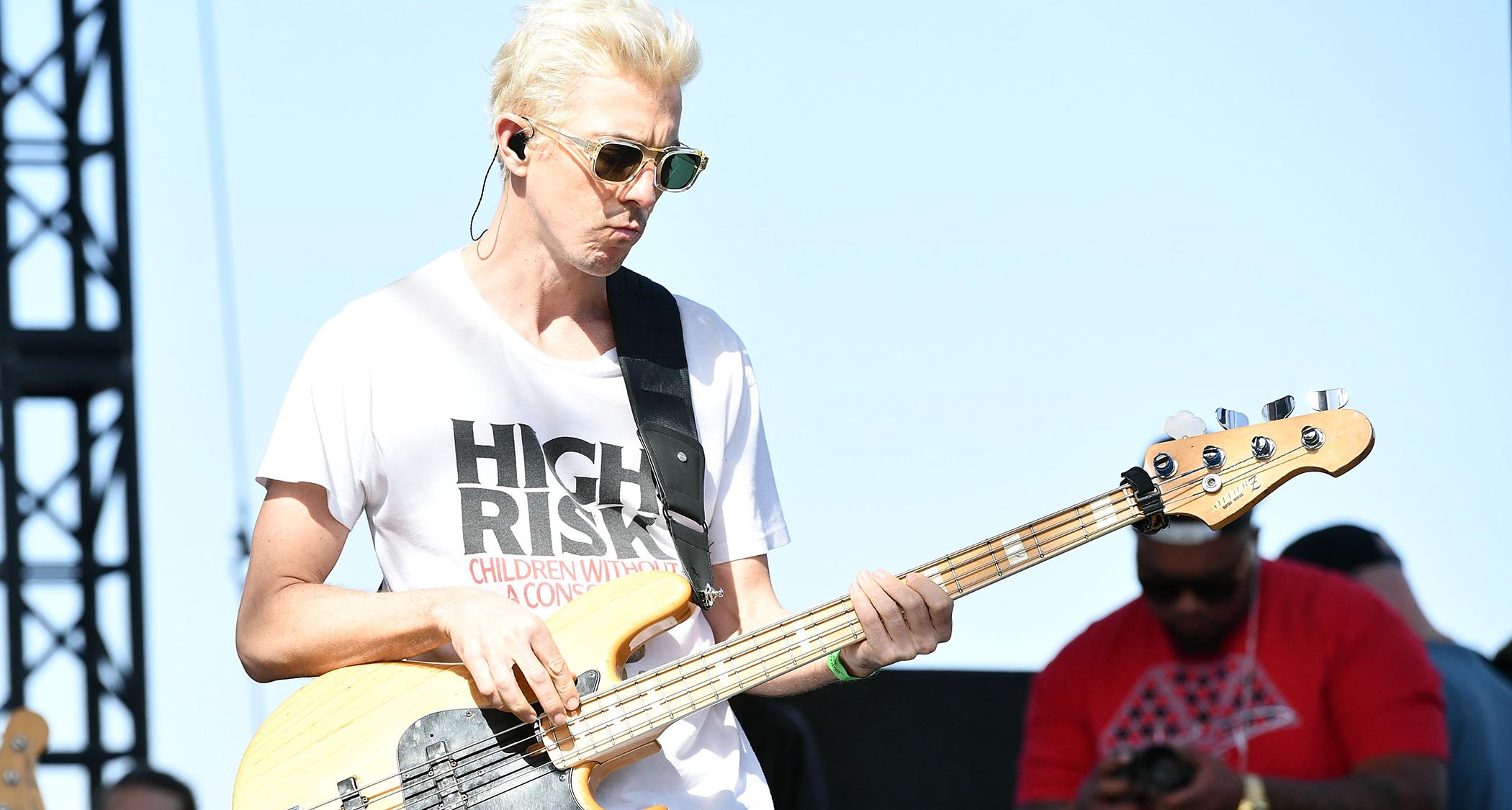Eddie Van Halen talks honing his technique, his imitators, and the origins of Eruption in this classic 1996 interview with Billy Corgan
In this gem from the GW archives, the alt-rock titan talks guitar, the music industry and more with one of his heroes
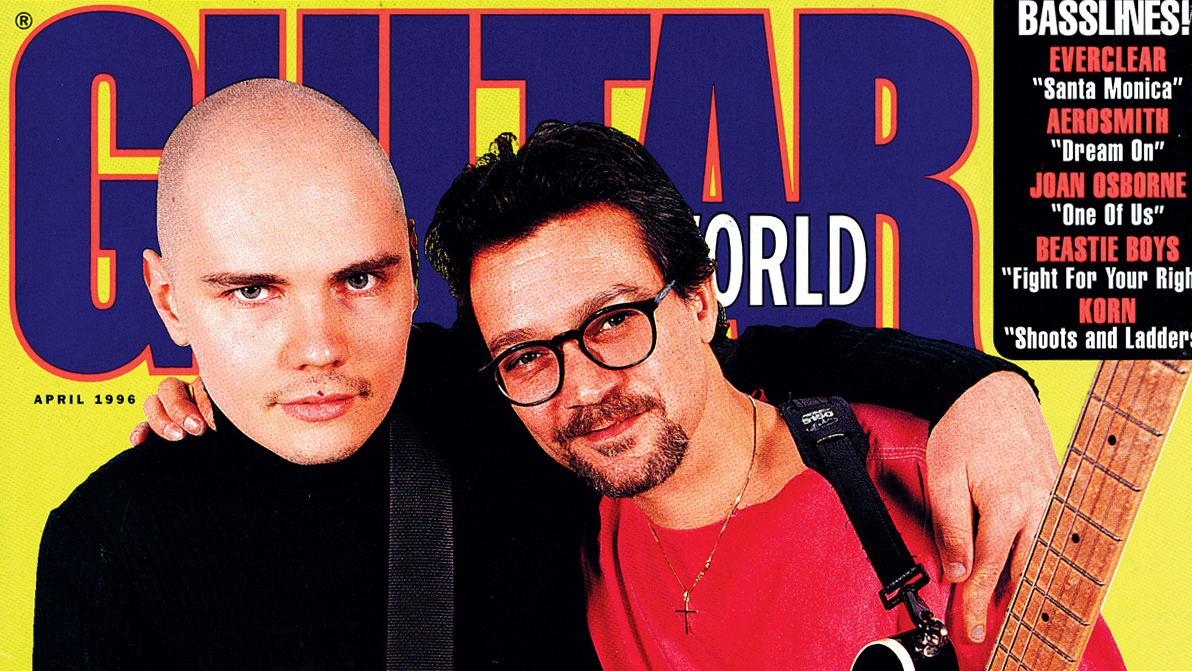
All the latest guitar news, interviews, lessons, reviews, deals and more, direct to your inbox!
You are now subscribed
Your newsletter sign-up was successful
This feature is taken from the April 1996 issue of Guitar World, for which Billy Corgan interviewed Eddie Van Halen. Corgan has since described the conversation as a "religious experience".
Make no mistake. Eddie Van Halen can still kick your ass. The man who single-handedly changed the face of rock is still mean, lean and sharp as a tack.
And if you dispute the ownership of the crown, try to imagine a world without him. I came to pay my tribute, sneak a peak at that famous Marshall and meet the man I most wanted to be at 17.
Billy Corgan: "I was very familiar with all the David Lee Roth-era albums through 1984, but when I prepared for this interview, I listened to everything so my questions wouldn't be just about the past.
"What struck me about the Sammy Hagar-era albums was that there was a slow but distinct movement away from the kinetic approach of the early albums to a more song-oriented focus. But I sensed that on For Unlawful Carnal Knowledge [1991] your playing was in a weird place, that maybe you were getting in a rut.
"But when I listened to your most recent album, Balance [1995], it struck me that you sounded like you were really enjoying yourself again. There was more focus and you sounded really energized."
Eddie Van Halen: "For Unlawful Carnal Knowledge took a year to record; that's why the playing on it might sound somewhat labored. Balance, on the other hand, was written and recorded in only four months, so the whole process was quicker and more immediate.
All the latest guitar news, interviews, lessons, reviews, deals and more, direct to your inbox!
"I also think our producer, Bruce Fairbairn, had something to do with the sense of excitement on Balance. Instead of arguing with me, he encouraged me to pursue my own ideas. He was somebody I could relate to. Together we were able to create a vibe, and creating the right vibe for things to happen is probably the best thing a producer can do.
"We interviewed so many producers before we started Balance, and he was the only one who said, 'Hey, waddaya got? Let's listen to some of your new music.' The others seemed more interested in trying to impress us with their credits, rather than finding out what we wanted to accomplish.
"So I'd have to say that musically nothing really changed between the two albums, but Fairbairn created an environment where something good could happen."
Corgan: "So after 20 years of recording, what makes you still want to rock?"
Van Halen: "It's because I'm still 16 inside. I still have that passion, and any true musician doesn't do it for any other reason than passion. My motivation has never been financial. Music is what I do. It's the only thing I know how to do."
Corgan: "But don't you ever have to fight yourself to keep your music exciting?"
Van Halen: "Sure. I have my low points. For example, we recently finished a pretty grueling 11-month tour and I was beat to hell. I was depressed. I had the post-tour blues – whatever you want to call it.
"Usually, I can shake it by just doing some work in my studio. Up until that time I always thought of my studio as my sanctuary – a place to jam and clear my head. But, for the first time, it didn't seem that way.
"I just didn't have the desire to play at all. In fact, I was so fried I wondered whether I was ever going to be able to write anything again. So, I just simply let go. Then, boom, one day, all of a sudden the desire came back.
"I think I learned something important. There are really three parts to the creative process. First there is inspiration, then there is the execution, and finally there is the release. The last part is more important than I ever realized. And after the last tour, I didn't allow myself to cleanse before I jumped back in, and it really screwed me up for a while."
Corgan: "One of the things that struck me after listening to all your albums is your fearlessness – you've never been afraid to go where you've wanted to go. You've played blues, you've played crazy music, you've played synthesizer music…"
Van Halen: "I think my desire to do my own thing came from my dad. He was a real soulful guy. He played sax and clarinet like a motherfucker. Unfortunately, he was also an alcoholic who died when he was 66. But he lived a full life.
There are really three parts to the creative process. First there is inspiration, then there is the execution, and finally there is the release. The last part is more important than I ever realized
Eddie Van Halen
"My mom, on the other hand, is 80, but she doesn't live. So I'm trying to find a balance between them. I don't want to be like my mom and live to be 80, and not live. And I don't want to die at 66 like my dad."
Corgan: "You created the sound of Van Halen. After all these years, how do you confront your own legacy? Do you ever worry about repeating yourself?"
Van Halen: "Not really. Change is a natural part of my evolution as a player. It just happens, because everybody changes over a period of time. It's a very unconscious thing. I think the unreleased acoustic piece I just played you before the interview sounds different from anything I've ever done, yet I didn't sit down and say, 'I have to do something different.'"
Corgan: "I admire your attitude, because I feel like I'm always fighting not to repeat myself."
Van Halen: "I don't know. Every time I walk into the studio it seems like the first time. It's like I've never written a song before. I am just as scared. In fact, someone asked me the other day, what I thought I had learned about making music after all these years, and I said, 'Nothing.' I'm scared shitless all the time. I'm really insecure that way."
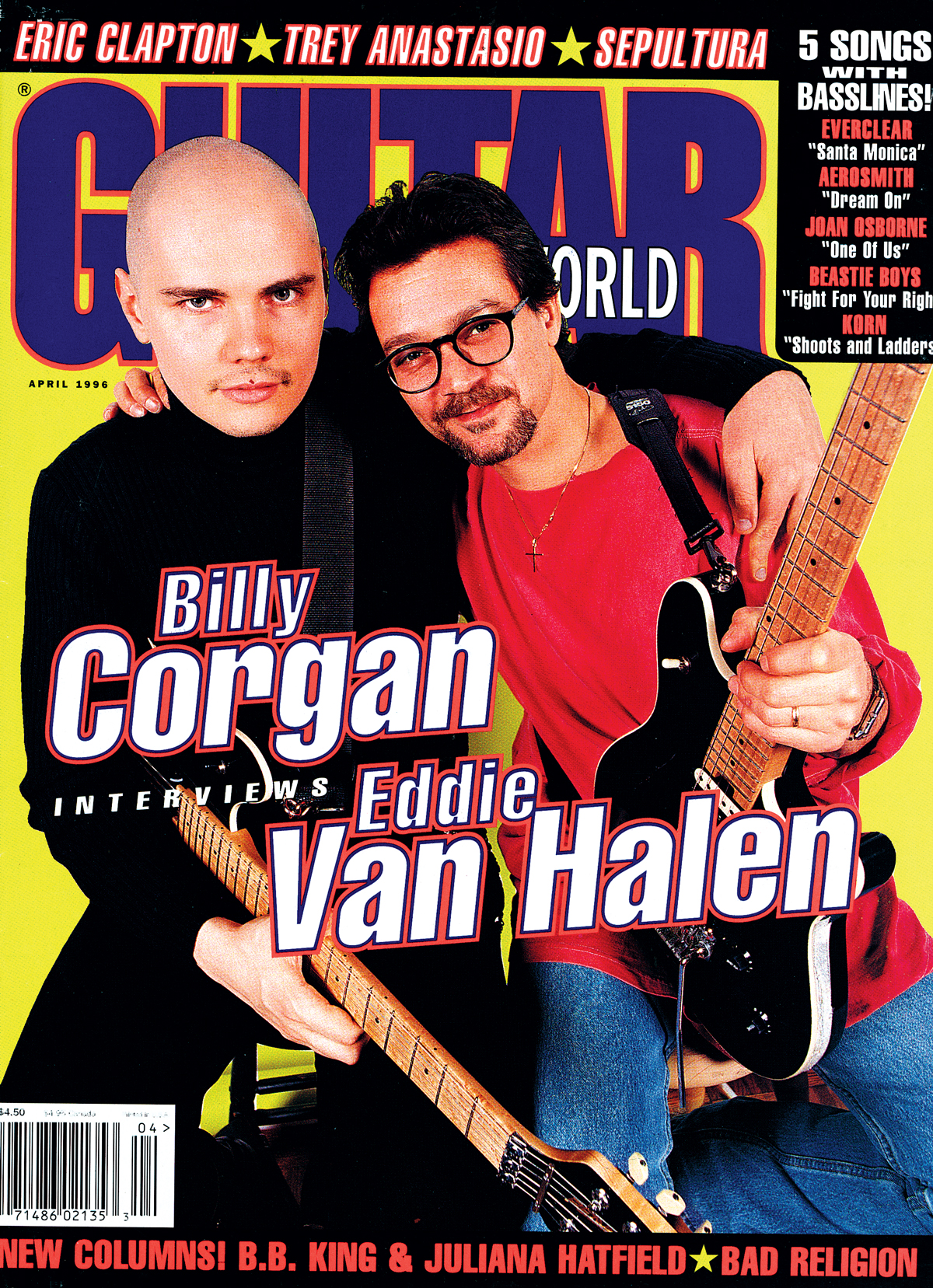
Corgan: "At what age did you start playing guitar?"
Van Halen: "I started smoking, drinking and playing the guitar at age 12."
Corgan: "And how old were you when you recorded your first album?"
Van Halen: "I was 22."
Corgan: "So how did you get from playing your first open G chord to playing Eruption?"
Van Halen: "Practice. I used to sit on the edge of my bed with a six-pack of Schlitz Malt tails. My brother would go out at 7 P.M. to party and get laid, and when he'd come back at 3 A.M., I would still be sitting in the same place, playing guitar. I did that for years – I still do that."
Corgan: "But where did that attack style of playing come from? At 22, you were killing people."
Van Halen: "I have no idea. I can tell you how I came up with certain techniques, but the rest is a mystery. It's the way I learned to communicate, because I was never very good with words. I was just chosen."
Corgan: "I find it interesting that it was so unpremeditated."
Van Halen: "I believe that every one on this planet is born with a gift, and I was just lucky enough to find mine. So I'm very blessed, and very grateful."
Corgan: "So, what was it like to wake up and find you were suddenly everybody's guitar hero?"
Van Halen: "It was weird. But I'll tell you what was even weirder. Before our first record came out, this guy wrote an article about the band in one of the major Los Angeles newspapers. He singled me out as the important member. He just raved about my playing and didn't really say much about Roth. And it freaked David out because he was the lead singer and frontman.
"It really upset him that I was getting the attention. I kind of felt bad and really didn't know what to do. It was like this journalist almost ruined the band and my life by praising my work. He actually hurt me by putting the spotlight on me. I was like, 'Fuck you, just let me play.'
"The tension it created in the band was unbelievable. I was like, 'Holy shit, David! What did I do wrong? Did I play too good? I'll play worse. Will that make you happy?'
Corgan: "Yeah, suddenly everyone was tapping and doing whammy-bar dives. What was that like?"
Van Halen: "Actually, I thought it was kind of funny. Because, with me, it was a form of expression – part of my style. When I used the stuff I invented, I was telling a story, while I felt that the people who were imitating me were telling a joke.
"I felt other players tended to use tapping and false harmonics as a trick, instead of incorporating them into their vocabulary."
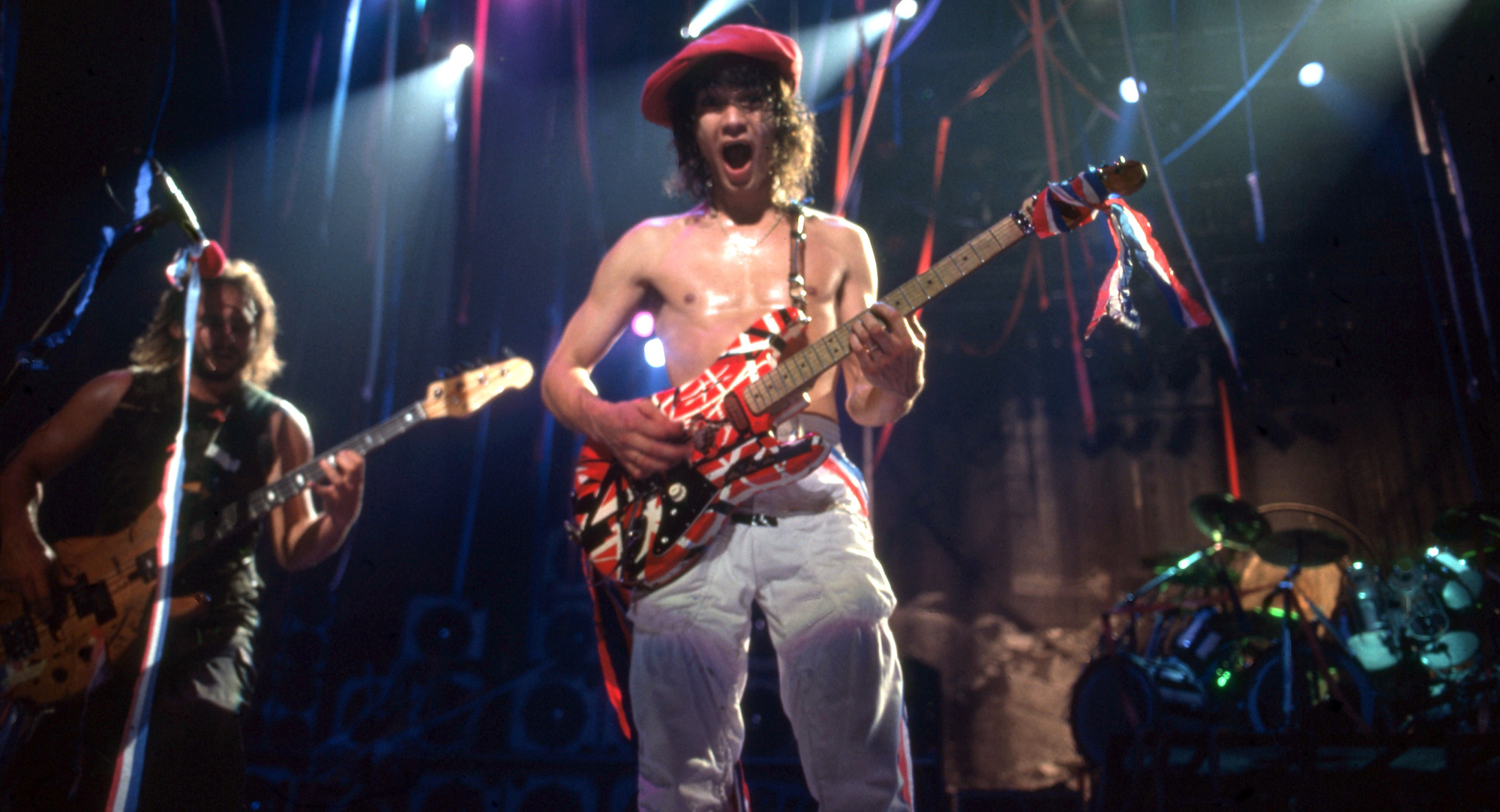
Corgan: "On your debut album, Van Halen [1978], your guitar solo, Eruption, was the second track. Wasn't it kind of a bold move to place this crazy guitar instrumental so close to the beginning of the record? Was it a conscious move?"
Van Halen: "The whole story behind Eruption is unusual. It wasn't even supposed to be on the album. I showed up at the recording studio early one day and started to warm up because I had a gig on the weekend and I wanted to practice my solo guitar spot.
"Our producer, Ted Templeman, happened to walk by and he asked, 'What's that? Let's put it on tape!' So I took one pass at it, and they put it on the record. I didn't even play it right. There's a mistake at the top end of it.
"To this day, whenever I hear it I always think, 'Man, I could've played it better.'"
Corgan: "But what was the idea behind making it the second track? It certainly gave it more weight than if you had sequenced it at the end of the album."
Van Halen: "I think they put it there because it was different, but I'm not really sure. At that point in my career, I really didn't have any control over anything. I was just like, 'Yes, sir. Whatever.' We barely had any input in the early days of the band.
"I mean, there are so many things wrong with those early records – the drums sound like shit on the first album and the bass is barely audible. We just played live, they recorded it, and it got put out."
Corgan: "How did you guys write the first album? It's my guess that much of your early music evolved out of jamming."
Van Halen: "A lot of the basic ideas were things that I came up with when I used to practice on the edge of my bed. I would take those ideas to band practice. At the time, we were rehearsing in David's father's basement, so me and AI would go over there by ourselves and jam on the ideas for hours until we came up with something we were happy with.
"For example, AI and I jammed on the basic riff from And The Cradle Will Rock two hours a day for two straight weeks. [laughs] We didn't really know what to do with it, but we were having fun because it just sounded so wicked. Then, out of nowhere, the chorus came to us and it was finished.
"Sometimes you really have to work for inspiration. But ultimately, it's not really work, because my brother and I genuinely love to jam. I'd say that's the way most things happen in our band.
"It usually begins with me and AI, which is funny in a way, because most people don't usually think of the guitar and drums as a unit. It's usually bass and drums.
Corgan: "But I think that's the way a band should be constructed – the core of a band should be built on the relationship between the guitarist and the drummer. It’s the simpatico relationship between me and our drummer, Jimmy Chamberlain, that provides the foundation for the Pumpkins. Drums can do so much more than just hold down the groove."
Van Halen: "Exactly. I think AI's drumming is more musical because he listens to me rather than just being concerned with maintaining a steady groove. Billy, how do you write with the Pumpkins?"
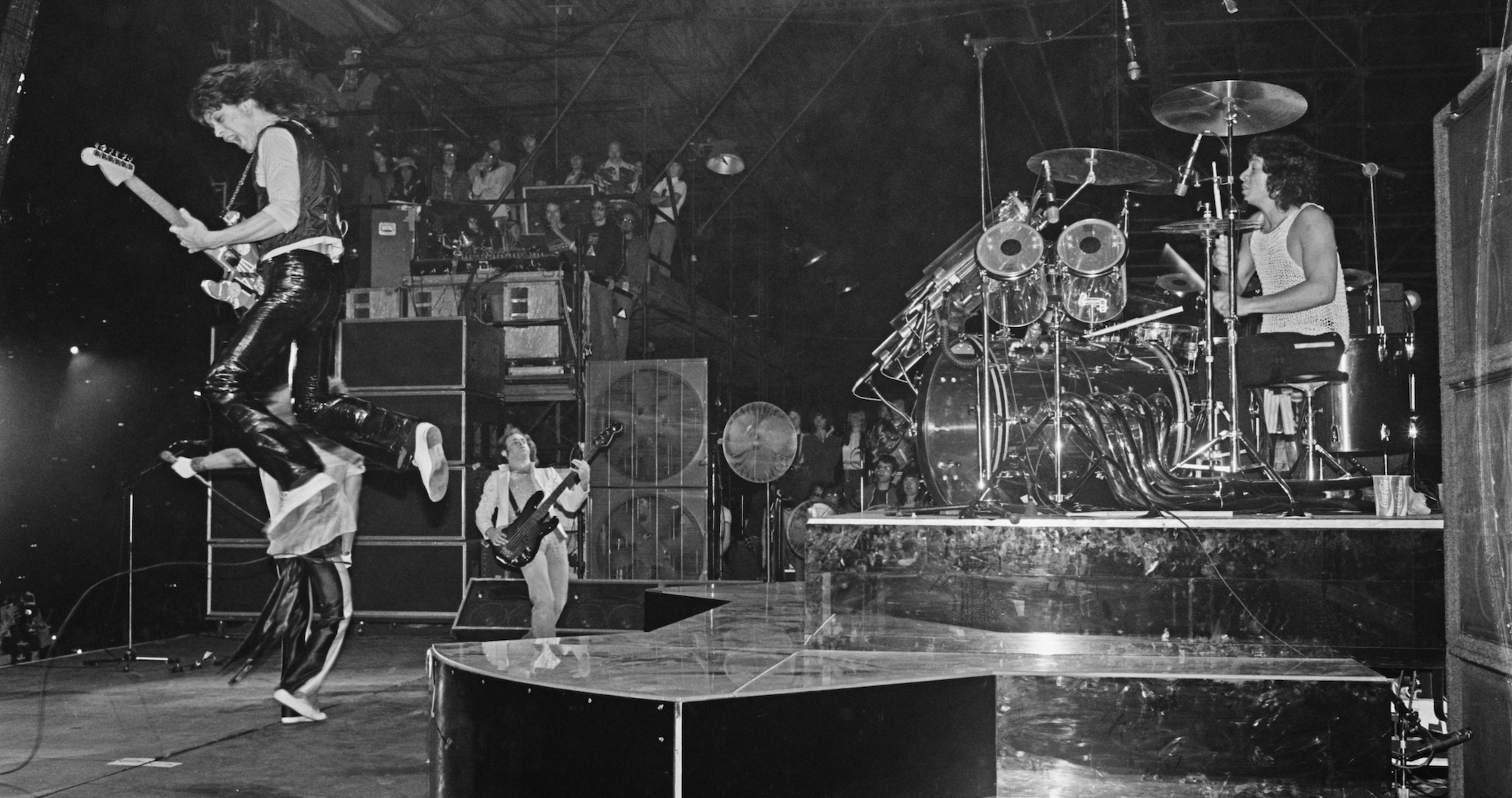
Corgan: "It's close to how you do it. I'm definitely responsible for coming in with some basic chord changes, or ideas. Everybody in the band looks to me to come up with the basic seed, so it's not very productive to come in with nothing."
Van Halen: "It's the same with us! You know, it's like, 'Well, watcha got, Ed?'
Corgan: "Yeah! And if you don't have anything, everybody will stand around and look at their watches and say things like, 'This is boring. Uh, can I go? I got a date tonight.' On the other hand, you can't do it yourself. I'll come in with a string of riffs, and direct the musical ideas. But you still need a band and their input to make the ideas come alive. You can't underestimate band chemistry. You still need that – it's that weird jelling of people.
"One of the cool things about Van Halen is that you've always been able to write great hit singles. Unlike other hard rock bands, you never shied away from writing pop music."
Van Halen: "Again, I just go with whatever comes out. I can't help the fact that I've written Can't Stop Loving You or Jump. Don't blame me. [laughs]
"Actually, if I could deliberately sit down and write a pop hit, all my songs would be pop hits! Let's put it this way. I play what I like to hear. And sometimes I like to hear something poppy, and sometimes I don't."
Corgan: "Van Halen II [1979] is a really good record, but it sounds to me like you really didn't have the time to fully explore all your guitar and song ideas."
Van Halen: "It was very hurried. We had just toured for a year, and we only had two weeks to write and record. But I'll never forget the questions we got after the second record was released: 'Why does this record sound different from the first album?' Because it's not the first album!
"It's always a Catch-22 situation. They hate you if you're the same, and they hate you if you're different."
Corgan: "But you agree that it wasn't completely realized?"
Van Halen: "Yeah, but I don't think it was because of us. There was a lot of cocaine on the console – and it wasn't necessarily the band's. That was a problem. And we weren't allowed any input on the mix. But ultimately we were just plain rushed. That's why you hear that little riff fade out at the end of the album – Al and I didn't want to stop. [laughs] We weren't done, but we had a deadline."
Corgan: "I think two great albums are Women and Children First [1980] and Fair Warning [1981]."
Van Halen: "I was starting to get more involved."
Corgan: "And it shows."
Van Halen: "Especially on Fair Warning. But what I had to do to get involved was very strange. We'd work during the day, and I wasn't very happy with the way things were going or the way people were approaching the whole recording process.
"I would sneak back into the studio at 4 a.m. with Don Landee, the engineer, and completely re-record all the solos and overdubs the way I wanted them. The fucked-up thing was, no one even noticed. That's how uninvolved they were on a musical level."
Corgan: "Fair Warning is a really mean, dark album. That was unusual for you guys. Up until that time you were more of a party band."
Van Halen: "It was kind of a dark period in my life. I was getting married, which flipped Roth out to the bone. I actually overheard him say, 'That fucking little prick, not only is he winning all the guitar awards, but he's also the first to marry a movie star.' So that's what I was up against. A guy that wanted everything that was going my way.
"The funny thing was, I really didn't want the attention, and it came to me, anyway. I didn't want the press – it was like, 'Leave me alone.'"
Corgan: "Let's talk about some of the specifics of Fair Warning. What can you tell me about Push Comes to Shove?"
Van Halen: "That was Roth's idea of trying to cash in on the reggae thing. I said, 'Okay, if you want that kind of beat, I'll see what I can do.'
Corgan: "That song has an incredible guitar solo!"
Van Halen: "I'll never forget that one. We were sitting in the studio with our producer, Ted Templeman, and I knew exactly what I wanted to do. I must have played that solo over 20 times, and Ted kept saying, 'No, it's not good enough.' So I said, 'Okay, but I don't understand what you want.' So we just called it a day.
"Later that night I came back and played the same solo that I played 20 times that day and left it. The next day he heard it and said, 'That's great.'
On the whole album I was angry, frustrated and loose.
"It's like the solo in Unchained. I love that song. It's rare that I can listen back to my own playing and get goose bumps, but that's one of them. My frustration continued to grow when we made our next album, Diver Down [1982]. Half that album was damn cover tunes, and I hated every minute of making it.
"David Lee Roth had the idea that if you covered a successful song, you were half way home. C'mon – Van Halen doing Dancing in the Street? It was stupid. I started feeling like I would rather bomb playing my own songs than be successful playing someone else's music.
"Ultimately, that's why I built the studio we're now standing in. I built it so I could work on my music without having to battle anybody. So after Diver Down I demanded that we do 1984 [1984] in my own studio, my way.
"The motivation behind Diver Down – which was to play it safe and make money – was completely different from 1984. One had heart where the other was bullshit. Diver Down is my least favorite record – even though I still tried to put myself into it."
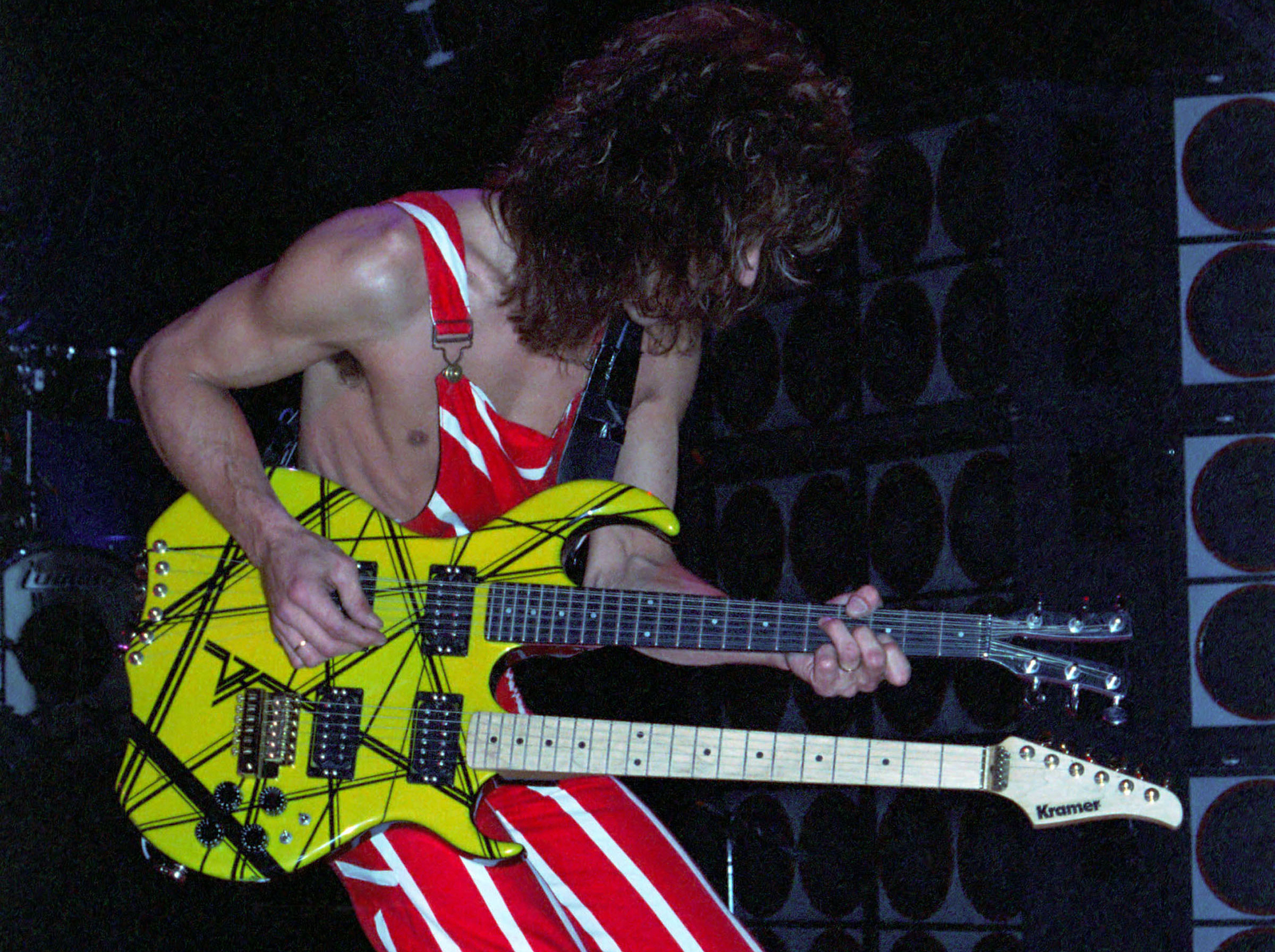
Corgan: "That's so strange, because a studio devoted to the band seems like such a positive thing."
Van Halen: "That's what I would've thought. But I was trying to take the band in a direction that I thought was appropriate, and Roth was trying to take the band in more of a Las Vegas direction. And there he is."
Corgan: "You did what you felt was right and it succeeded. I ran into similar obstacles recently. I met with a lot of resistance when I wanted our newest album [Mellon Collie and the Infinite Sadness] to be a double CD. Many people thought I was going to ruin the band by doing it. But it proved to be the right thing."
Van Halen: "You have to follow your heart. But don't ever get cocky and say to yourself, 'Hey, I was right.' Just do what you feel. Do you understand what I mean?"
Corgan: "Yes, you can't gloat."
Van Halen: "Right. When Jump went Number One, I was almost embarrassed. You did this double album because it's what you wanted to do, not because you wanted to prove anybody wrong or make money."
Corgan: "In the beginning, though, I have to admit that I did have a chip on my shoulder. I did want to prove everyone wrong. But after I went through the process and came out the other side, I realized why I had to do it. It wasn't about anyone else. In fact, the deeper I get into my life as a musician, I'm discovering that it becomes less and less about other people, and more about what I want to do. And that's a good place to be.
"So I can understand what you're talking about. There are all these fish swimming around you, and their motivation is not necessarily to make sure that you're playing great or that you're going have a great show that night. Instead, it's, 'Are there people in the fucking seats?'"
Van Halen: "The thing is, after 20 years it doesn't change! I hope you're prepared for that." [laughs]
Corgan: "I read in Van Halen II's liner notes that you guys once parachuted into a stadium show. [laughs] What was that all about?"
Van Halen: "That was one of Roth's big ideas. I'm not even sure why, but he said, 'Let's parachute into the stadium.' Of course we couldn't do it ourselves, so we hired four professional sky divers to jump out of an airplane right before our set.
"The idea was that we would wear identical gear and run on stage and pretend it was us that jumped out of the plane. So there we were, wearing these crazy, heavy outfits, sweating our balls off, waiting for the sky divers to come down so we could jump on stage.
"It was so silly, and it almost turned into a complete catastrophe, because while we were trying to get out of the gear, AI severely twisted his ankle and had to play the show with practically a broken foot. I guess that's why Dave's in Vegas. He saw playing music as show biz, and it's not show biz to me.
"I should've known when Roth said, 'Let's say we're two years younger than we really are.' And I'd say, 'Why? I'm only 22. What's the difference?' That still causes problems for me to this day. I'm 41, and people think I'm 39."
Corgan: "But in a positive light, it sure made things interesting in an incredibly dull period of music."
Van Halen: "Hey, we were young and crazy. We were trying to do all the things that Led Zeppelin did – throw televisions out the window, and so on. We used to drive people crazy. For example, very early on, we were on a tour supporting Journey. They would never give us soundchecks and treated us like shit in general, so we liked to fuck with them anyway we could.
"So while they were on stage we would sneak in and destroy their rooms – we'd use fire hoses and extinguishers, whatever we could get our hands on. What really drove them crazy was that at the beginning of the tour no one knew who we were. The audience would say, 'What the fuck is this?' But by 30 dates into the tour, we were the ones selling the tickets.
"In fact, halfway through the tour we wanted to bail, and despite all the shitty stuff we did to them, they begged us to stay on. Needless to say, we didn't." [laughs]
"Here's another good story from that tour: We were in Madison, Wisconsin, and while I was out of my room, AI and David snuck in and grabbed my table and chairs, took out the screen and threw them out the window. When I came back to my room I was like, 'Where the hell is my table?' So I looked out my window and there, seven stories down, were my chair and table lying in the snow."
"I figured it must have been Roth, so I went down to the desk and said, 'My fucking years. I've taken them!' There's a plaque on our wall that says we've sold over 65 million albums, and I don't feel I've accomplished anything. I feel like I'm just getting started."
Corgan: "That's the artist in you speaking. Even in your guitar hero days, you were never vainglorious of it. The band has never appeared snooty or snotty. And I think that's why your fan base is big. You guys never went through that "sick period" that a lot of bands who've recorded for 20 years often go through, where they hit rock bottom with their fans.
"Even around Diver Down, which admittedly is not your strongest effort, people were still there for you. And I think that says a lot about you personally. That you care, you want to have a good time, and you want others to have a good time.
Van Halen: "And I think there's a certain amount of honesty and heart and soul that goes into it that people can feel, even on Diver Down."
Corgan: "That's why you'll always have people on the other end for you."
Van Halen: "Music is for people. The word 'pop' is simply short for popular. It means that people like it. I'm just a normal jerk who happens to make music. As long as my brain and fingers work, I'm cool."





